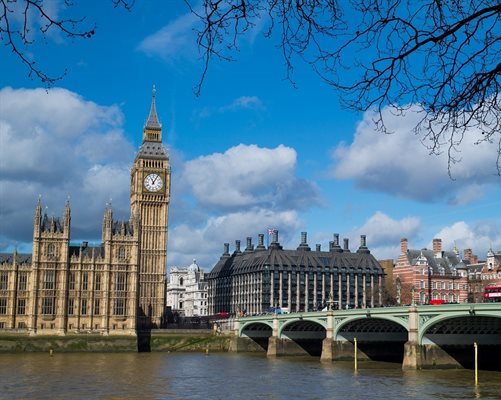Posted on Thursday 14th December 2017

A view of Big Ben from the gardens of St Thomas' Hospital.
Sleep experts at Evelina London Children’s Hospital will be monitoring their patients closely this Christmas, the first since 1859 when Big Ben will not be chiming.
Writing in the Christmas edition of medical journal, the BMJ, Dr Michael Farquhar, consultant in children’s sleep medicine, discusses evidence of sleep disruption when Big Ben chimes, an effect they refer to as ‘Big Ben arousals’. The disruption is visible to clinicians carrying out polysomnographies – where children’s sleep patterns are monitored and analysed.
Dr Farquhar explains: “Many of the 200 children who come to Evelina London’s sleep clinic every year have conditions such as autism, and can be very sensitive to light and noise. The noise of the Great Bell is one common reason given for why children, and their parents, attending our sleep centre don’t sleep as well as they normally would”.
Evelina London is already planning for 2021, when Big Ben’s chimes will begin anew. Next year, our sleep services will be expanding, with improved soundproofing to help reduce the impact of Big Ben’s bongs.
Dr Farquhar said: “Getting enough good quality sleep is essential for every aspect of physical and mental health. Even if we think we have slept long enough, if our sleep quality is poor we will be irritable and tired the next day. Over time, sleep deprivation can increase lifetime risk of conditions such as heart disease, stroke and hypertension.
“In a survey by the Sleep Council earlier this year, a quarter of respondents cited noise as the main reason for experiencing disturbed sleep. While most of us don’t sleep within earshot of Big Ben, many of us sleep where the outside world can noisily intrude into our bedrooms as we slumber.”
In 2015, Guy’s and St Thomas’ NHS Foundation Trust worked to improve sleep quality for every patient, with a focus on reducing night time ward noise and planning their care to lessen the number of times they need to be woken during the night.
Dr Farquhar said: “Noise reduction strategies, such as earplugs or use of white noise, should be actively considered as part of overall plans to improve sleep quality. Raising awareness of simple measures to achieve good quality sleep can make a big difference, and bring important benefits for overall health.”
Find out more about how Evelina London is growing, building a bigger and better children’s hospital.